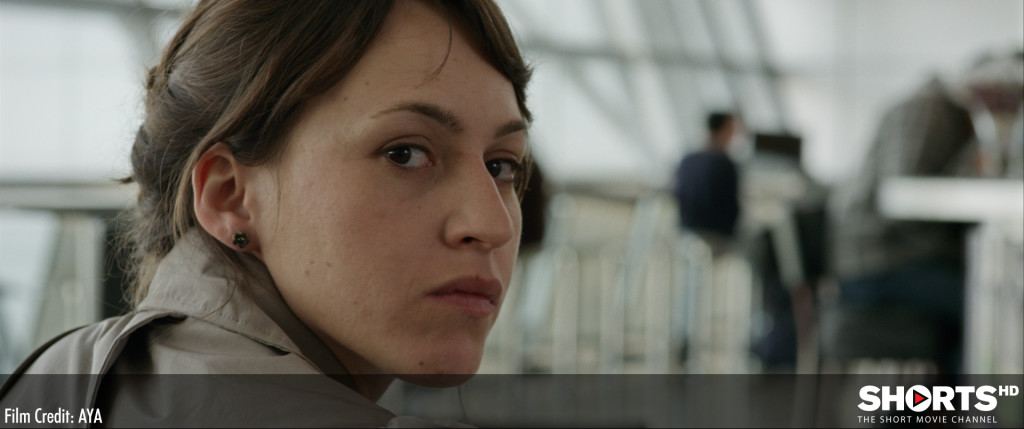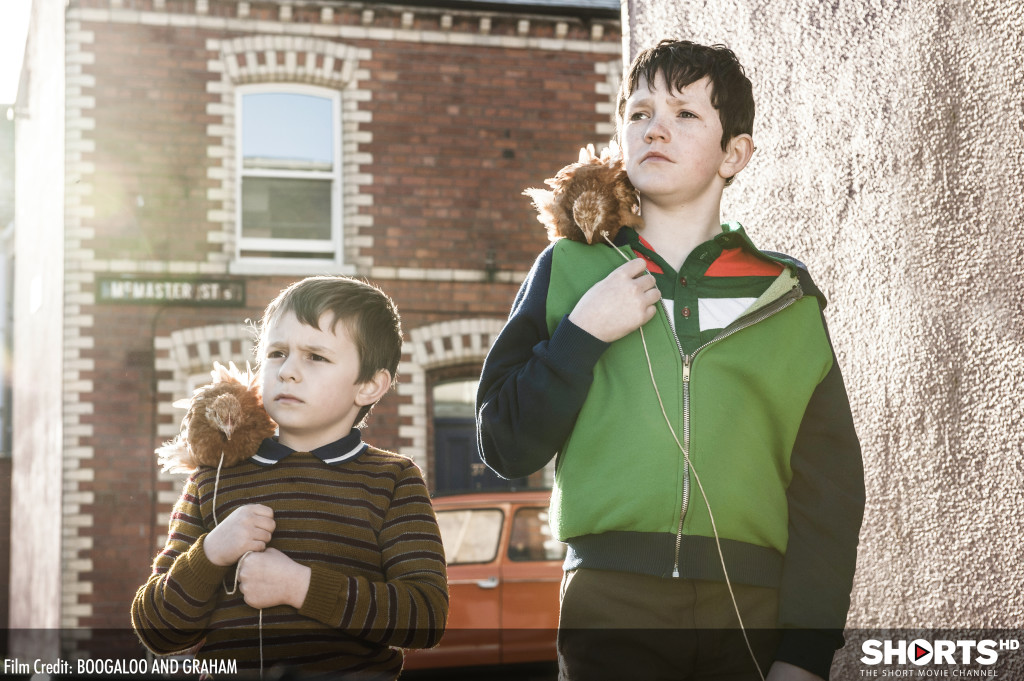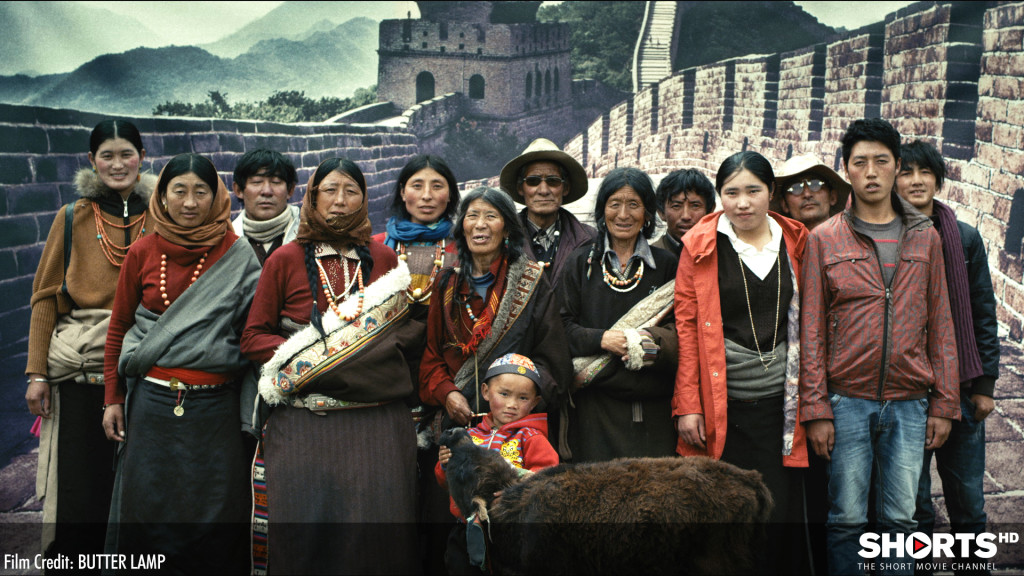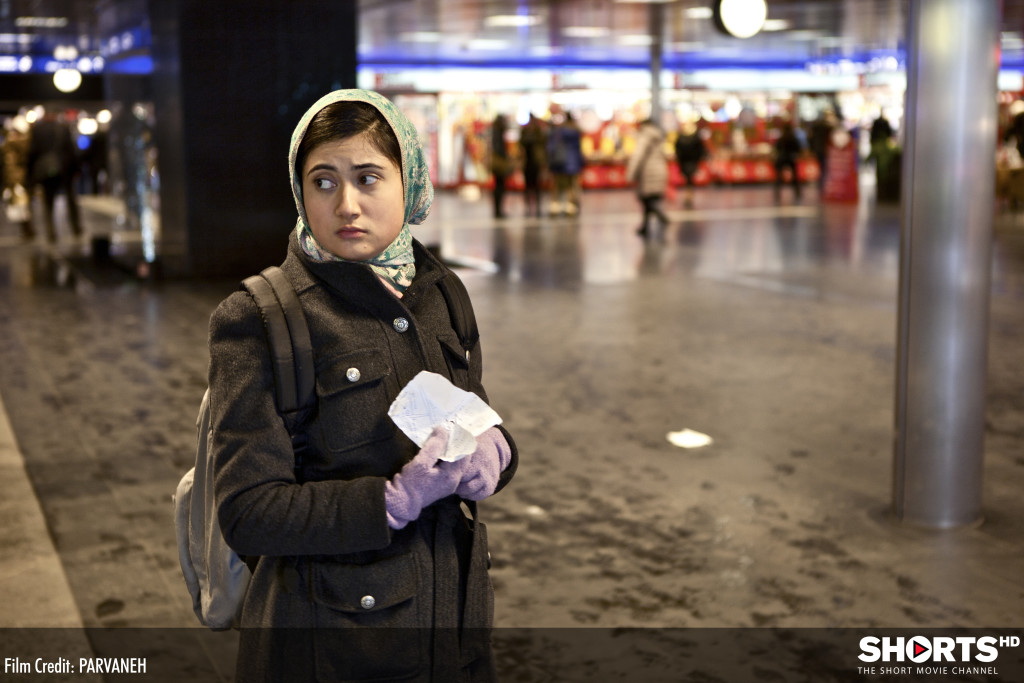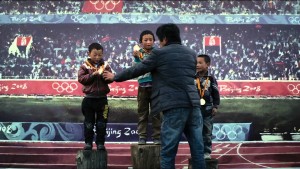
Oscar Shorts Week: Part Two of Three
2015 Academy Award Nominated Live Action Short Films
Sundance Cinemas Screening Room Calendar, January 30-February 12»
A serious tone dominates this year’s Live Action Short Film nominees. Three of the five narratives feature strangers with different backgrounds meeting to face a conflict together. Ironically, the most satisfying conventional drama is the one with a comic tone, Boogaloo and Graham. But the highlight of the nominees, Butter Lamp, distinguishes itself by not mimicing Hollywood storytelling in short form.
This week the Madison Film Forum will look at each of the Academy Award nominated shorts programs that will play at Sundance Cinemas for a two-week run starting this Friday, January 30.
Tuesday: Taylor Hanley on the Animated Shorts
Today: James Kreul on the Live Action Shorts
Thursday: Jake Smith on the Documentary Shorts
Perhaps it is the influence of the debate over diversity at the Oscars this year that has influenced me, but at first glance diversity of backgrounds seems to be a theme connecting several of this years live action shorts. Three of the five nominees feature narratives where strangers meet and must face a conflict together, and in two of those the strangers have distinctly different cultural or economic backgrounds. Perhaps the short form, outside of the concerns of blockbuster economics, allows for more experimentation and diversity of backgrounds.
But on further reflection, perhaps this initial impression doesn’t hold up. Perhaps it is indeed the lack of diversity in mainstream feature filmmaking that made me even think this was a possible theme when presented with a small degree of diversity. The strangers-meeting trope might be just as problematic as the trend to cast recognizable stars to lead us to less recognizable places or cultures in mainstream feature films. For that reason, the truly refreshing film among this year’s nominees is Hu Wei’s Butter Lamp, which immerses us in a social and cultural moment instead of introducing us to one vicariously.
That said, with one exception I liked all of the live action nominations to varying degrees. The one exception was The Phone Call, which as I suggest below was particularly disappointing given the talent involved. I prefer to think of the short film as a distinct form, not just a stepping stone for feature films. But I do hope to see more (long or short form) from several of these filmmakers, not only Hu Wei mentioned above but also Northern Ireland’s Michael Lennox and Iranian-born Talkhon Hamzami. All of these filmmakers understand how to guide nuanced performances and craft vivid images, regardless of the total running time.
Aya | Mihal Brezis and Oded Binnun | Israel, France | 2012 | 39 min
A woman, Aya (Sarah Adler) waits at an airport arrival gate when a driver asks her to hold a sign for a “Mr. Overby,” to assist a colleague whose car must be moved. When Mr. Overby (Ulrich Thomsen) arrives, instead of informing him about his assigned driver, she decides to drive him herself to his hotel in Jerusalem. The bulk of Aya takes place in her car as she and Mr. Overby get to know each other, then must get to know each other again after she reveals the truth about her identity.
Aya features two very sharp performances: Adler has appeared in films such as Jean-Luc Godard’s Notre Musique (2004) and Sofia Coppola’s Marie Antoinette (2006), and you’ll probably recognize Thomsen from Thomas Winterberg’s The Celebration (1998). The dramatic beats during the car ride, however, are either a bit forced or artificially prolonged as Aya insists on playing games to keep the conversation going. Aya repeats that she needs to tell Overby something, but then uses various tactics to avoid doing so.
While sexual tension is addressed and dismissed early on, the two develop a unique intimacy during the course of their drive and conversation, despite the fact that they’re not quite sure what is really going on or what motivates the other.
Ultimately, the ambiguity about Aya’s backstory, including why she was at the airport at the first place, undermines any satisfying dramatic resolution in the end. But perhaps we would never get any closer to Aya, since she states that she often feels closest to strangers.
Boogaloo and Graham | Michael Lennox | UK | 2014 | 14 min
Jamesy and Malachy are two boys growing up in late 1970s Northern Ireland who are delighted when their father gives them two baby chicks as pets. This does not please their mother, however. When the boys take action to defend their pets from impending expulsion from their home, they inadvertently learn a harsh lesson about the larger conflict in the streets of Belfast.
Boogaloo and Graham is the strongest of the conventional narratives in the program, because despite the overall comic tone the film contains the most genuinely dramatic moment of all of the nominees. It is also the most efficient of the conventional narratives, concisely setting up the premise and allowing for several comic moments before and after the key dramatic one.
The two boys are genuinely funny; director Lennox and writer Ronan Blaney allows them to be children rather than the wise-beyond-their-years children seen in some films. The boys are so confident in their world view (they commit to vegetarianism, without truly understanding the consequences) that it is all the more dramatic when they see what grown-up conflict look like.
Butter Lamp | Hu Wei | France, China | 2013 | 15 min
A traveling photographer takes portraits of rural Tibetan nomads in front of various background drops. While the camera remains static, families and local villagers walk in and out of the frame providing a portrait of a community going through a significant and dramatic social and economic transition.
Butter Lamp is my personal favorite of the nominees, because its structure and style is the most adventurous and it does not attempt to replicate Hollywood storytelling in short form. The minimalist style is deceptively simple, because many details must be noticed in order for the final reveal to truly pay off.
A portrait of an elderly woman is disrupted when she insists on bowing to the backdrop photograph of the Potala Palace (the residence of the Dalai Lama until he fled in 1959), a wry comment on the power of imagery. But it is not until the end of the film that we truly understand how technology is intruding on the woman’s life. The final shot is easily the most vivid and memorable of the program; it is not only visually striking but it also provides a generous dose of irony.
Parvaneh | Talkhon Hamzavi | Switzerland | 2012 | 25 min
Parvaneh is a young Afghan immigrant living in rural Switzerland who discovers that her family back home needs money to pay for her father’s medical expenses. When she overhears a conversation about “Western Union,” she travels to Zurich alone, only to discover that she needs to be 18-years old to wire the money. An 18-year old punk girl, Emily, agrees to wire the money for her for a percentage of the transaction. When they discover that the Western Union has closed, Parvaneh must spend the evening with Emily if she wants to try again in the morning.
Director Talkhom Hamzavi was born in Iran in 1979 and has lived in Switzerland since 1986, so clearly she has drawn from her own experience of culture shock and the good and bad aspects of Western culture. The film is at its strongest when it shares Parvaneh’s small observations and discoveries, such as when she samples some lipstick in a department store.
While the central narrative is somewhat predictable, the relationship between Parvaneh and Emily does have a satisfying arc. Given Parvaneh’s dedication to her family, she cannot understand the disrespect Emily shows her own mother. Their best shared moment is when Parvaneh, who had taken her shawl off for perhaps the first time when she arrived in Zurich, wraps Emily’s head in the same shawl in the Afghan manner.
The Phone Call | Mat Kirby | UK | 2013 | 21 mins
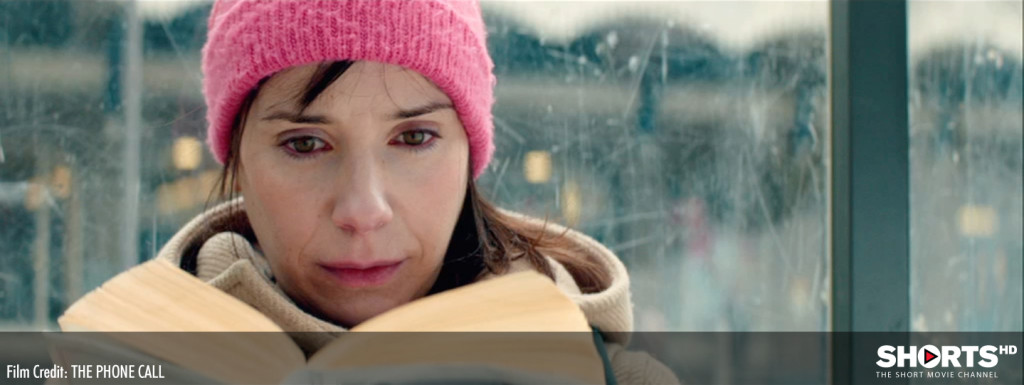 Heather (Sally Hawkins) works at a crisis hotline call center and she receives a call from a man (Jim Broadbent) who has overdosed on anti-depressants and does not want to be alone in his final moments. Heather must keep her promise not to trace the call as she tries to piece together information that would help her send an ambulance to the man’s location.
Heather (Sally Hawkins) works at a crisis hotline call center and she receives a call from a man (Jim Broadbent) who has overdosed on anti-depressants and does not want to be alone in his final moments. Heather must keep her promise not to trace the call as she tries to piece together information that would help her send an ambulance to the man’s location.
The Phone Call clearly has the most star power of any of the nominees. Hawkins was nominated for Best Supporting Actress in Blue Jasmine (2013), and Broadbent won for Best Actor in Iris (2001). The film is co-written and directed by commercial and music video director Mat Kirkby, who works with Ridley Scott Associates. Yet despite all of the talent involved, and the fine performances by Hawkins and Broadbent (who is only heard off-screen), The Phone Call never builds any genuine dramatic tension.
Kirkby cannot seem to figure out how to tell the story visually, and too often he over-emphasizes details that do not enhance the storytelling. The odd coda at the end with Hawkins and her co-worker seems tacked on as an afterthought, and certainly does not provide any real sense of dramatic closure.
So . . . who is going to win?
Which film should you pick for your office pool? I usually make the mistake of picking the film that I want to win, which in this case would be Butter Lamp. I would have to look at the last few winners to see if there is any pattern in terms of star power and whether it helps or hurts a films chances. If it helps, then The Phone Call might do well despite my opinion of it, or Aya might do well thanks to the presence of Ulrich Thomsen. If the voters are looking for a balance of entertainment and storytelling, then the charming Boogaloo and Graham will do well. But Parvaneh also has a legitimate chance, with its strong performances and assured storytelling from a young talented filmmaker.
That’s my long-winded way of saying I don’t know who’s going to win. Good luck. And meanwhile, if you catch the films at Sundance, please let me know your thoughts in the comments below.
